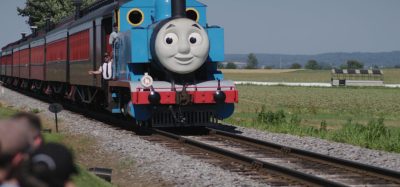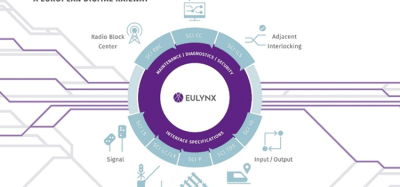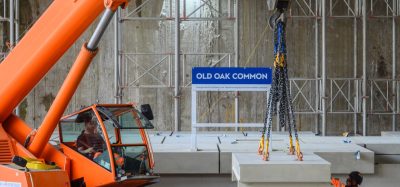Shipshape and Bristol fashion
Posted: 10 December 2010 | | No comments yet
Freightliner Maintenance Ltd (FML) faced significant challenges to turn an abandoned freight terminal into a fully-functioning railport for a customer running liquid products. In an interview for Global Railway Review, Dave Curtis, General Manager of FML, explains the work involved with this important project and also the success so far of FML now that it operates as a separate unit within Freightliner Group Ltd.
Freightliner Maintenance Ltd (FML) faced significant challenges to turn an abandoned freight terminal into a fully-functioning railport for a customer running liquid products. In an interview for Global Railway Review, Dave Curtis, General Manager of FML, explains the work involved with this important project and also the success so far of FML now that it operates as a separate unit within Freightliner Group Ltd.
Freightliner Maintenance Ltd (FML) faced significant challenges to turn an abandoned freight terminal into a fully-functioning railport for a customer running liquid products. In an interview for Global Railway Review, Dave Curtis, General Manager of FML, explains the work involved with this important project and also the success so far of FML now that it operates as a separate unit within Freightliner Group Ltd.
The South Liberty Lane depot near Bristol was closed by Network Rail 20 years ago, although kept as a strategic site, 2010 saw Freightliner commence new container services from the South East Ports.
Most of the 7 acres site was abandoned to the forces of nature – and local fly-tippers – although some hard-standing was used for storing caravans and as a ‘park-and-fly’ for people using nearby Bristol Airport.
Then Freightliner began discussions with the Hillebrand Group, the world’s leading specialist logistics company for the wine and spirits trade, about running trains into the Bristol area. One of the group’s subsidiaries, Trans Ocean, transported in bulk from around the world and needed to deliver it to the largest bottling plant in Europe – which is in Avonmouth.
Dave Curtis, General Manager, Freightliner Maintenance Ltd (FML) says it was obvious from the beginning that the restoration of the South Liberty Lane depot would require significant investment.
“Not only was there a huge amount of debris and vegetation to clear at ground level, there were 20-30ft high trees, with roots firmly wound around the existing tracks, which needed to be removed,” explained Mr. Curtis. “Only then could we begin to look at replacing the signalling, relaying the tracks and doing all the other installation work.”
Luckily, Freightliner Maintenance has come a long way in recent years, especially since it was established as a separate unit within Freightliner Group Ltd in 2005. Initially its work was confined to the repair of traction and rolling stock but it has now established its own track maintenance team which offers track maintenance and specialist railway infrastructure services.
“I knew that our team had the skills, the experience and the equipment to tackle this task and to do it quickly and cost-effectively,” explains Mr. Curtis.
The decision to use South Liberty Lane was taken early in 2010 and the first task was to quickly cut down any trees that could potentially become nesting sites for breeding birds in the spring. So, by the end of February, the large trees were all felled and planning for the rest of the work had begun.
The final agreement from Network Rail and BRB property board was gained in mid-April and the team then had just six weeks to meet the customer’s deadline of 1 June to run the first train.
“We cleared the site of all the vegetation as well as all the rubbish which included old fridges, used car tyres, dumped concrete blocks and just about anything else you could think of!” says Mr. Curtis. “Then we set about digging the existing tracks and sleepers out from the tree roots.”
Heavyweight bulldozers were needed to dig down deep enough to lift out the roots of the trees. The sleepers fell apart when they were removed but much of the track was in good enough condition to be restored and re-used.
“We cleared out two sidings – of 19 and 20 wagon lengths, with an additional 3rd run round track (almost 4000ft of new track) – and then we could start the task of building the new infrastructure,” says Mr. Curtis.
The team met with Network Rail to discuss a totally revised method of working from the 1990 operations at the site and to agree the realignment of the track linking the railport with the main railway network – they had to slew the track from its original route and create a new link into the old sidings.
Then the work of building up the new tracks began. Over 250 tonnes of stone ballast was delivered to the site, new sleepers installed, then the rails, points, and crossings.
“We had members of the team working 12 hours shifts and also brought in extra people when needed, to make sure that we would meet the deadline,” explained Mr. Curtis.
While this work was going on, other contractors restored the old workshop with new windows, doors and electrics as well as fittings. Also, in accordance with Customs and Excise regulations for imports, palisade fencing, CCTV and secure pedestrian and vehicle entrances were set up.
The deadline of 1 June 2010 was met and now there are five trains a week arriving at the site, three from the Port of Tilbury and two from Thamesport. Services from Felixstowe are also planned and in October 2010, Freightliner Maintenance went back to bring a third siding into use at the site.
“The initial investment in the site was about £750,000 and we will continue to upgrade as necessary as business grows,” says Mr. Curtis. “We expect that, now we have Bristol Railport established, we will be able to win new business and bring trains in for other customers who are importing into or exporting from the southwest.”
Adam Cunliffe, Managing Director for Freightliner Ltd commented, “We have been extremely impressed with the Freightliner Maintenance track team, not only completing this project on time, but also on budget, allowing us to deliver our excellent service levels to our newest customer.”
Freightliner Maintenance is part of the Freightliner Group which also includes both intermodal (Freightliner Ltd) and bulk (Freightliner Heavy Haul Ltd) businesses. The group is based in the UK but Heavy Haul has established business units in both Poland and Australia in the last few years.
Building up the maintenance business
Each business unit within the Freightliner Group operates independently and Freightliner Maintenance Ltd (FML) is not automatically awarded any work which other divisions may have.
“By bidding against other maintenance companies – whether for rolling stock or infrastructure work – we have realised that we can offer a very cost-effective service,” says Mr. Curtis. “And, as part of the Freightliner Group, our team has special insight into exactly what customers need – and we do whatever is necessary to minimise any potential disruption to services.”
So, five years after it was launched as a separate unit, FML is actively marketing itself to third parties who need track maintenance services – inspections, maintenance and renewals.
An experienced team of civil engineering professionals offers a range of infrastructure services nationwide and have carried out several civil engineering projects including building works, S&C replacement, major siding renewals and road construction.
“Our team is available for routine inspections, major project work and on call assistance nationwide 24/7,” says Mr. Curtis. “We know how important it is that that customers’ requirements are met at all times. We have a wide range of engineering equipment and mobile plant, enabling us to offer our services anywhere in the UK. Our vehicles always carry a good selection of critical spares and tooling, so if a safety-related track defect is identified during an inspection it can be repaired immediately to minimise effect on rail operations.”
FML undertakes track inspection/ maintenance at Crewe Basford Hall which, with more than 37 miles of track, 56 sidings and 114 sets of hand points, is the largest local distribution centre in the UK. Mr. Curtis comments: “With over 200 trains per week, it is essential that the track maintenance team provides a professional and dependable service to enable the operations to continue safely and on time.”
The launch of Freightliner Maintenance as a separate unit has proved to be a good decision, says Mr. Curtis. “We proved ourselves on the rolling stock maintenance first – reducing both costs and downtime – and now we are building a similar reputation for excellence in track maintenance services.”
About the Author
Dave Curtis
Dave Curtis is the General Manager for Freightliner Maintenance Ltd (FML). He has responsibility for all the activities undertaken by FML and has seen it grow substantially since it was established. Previously he held the position of Chief T&RS Engineer and had responsibility for the maintenance of Freightliner’s fleet of over 160 locomotives and more than 3,000 wagons. Prior to joining Freightliner in September 2005, Dave Curtis held management positions with South Eastern Trains, Angel Trains and was the Site General Manager at Chart Leacon for Bombardier Transportation, responsible for fleet maintenance, heavy maintenance and refurbishment of passenger rolling stock.







